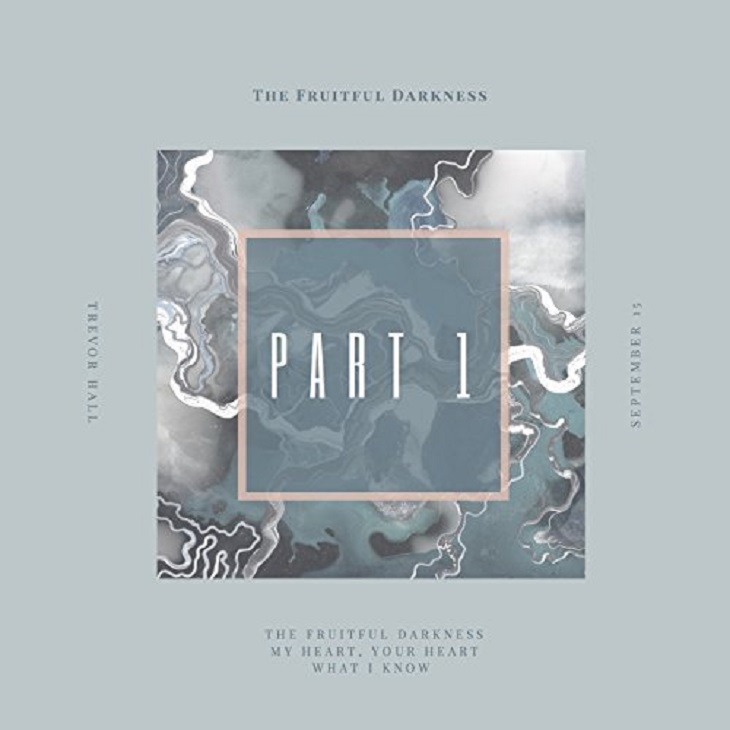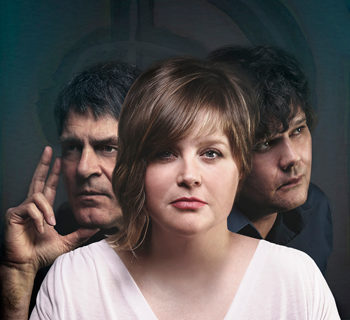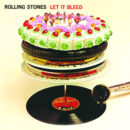Trevor Hall Gathers Fruit Out of Darkness
Trevor Hall is a difficult man to categorize.
Like his music, the 30-year-old musician from South Carolina combines folk, reggae, roots, and Sanskrit chanting in a postmodern mashup of archetypes, cultures, and times. On one level, he's the classic all-American troubadour—a man with a guitar, three chords, and the truth—yet he's also a devotee of Indian religion, living part time in ashrams and taking 12-year vows to not cut his hair. On top of all that, he's a shrewd self-promoter and entrepreneur, who works social media masterfully to build and maintain a cadre of devoted fans he calls his "villagers." In short, just might be the perfect singer-songwriter for his generation.
Much of Hall's shtick seems too theatrical to be true, but that cynicism falls apart after listening to him speak and perform. His intense blue eyes pierce the space before him as he discusses his music, as though looking for answers to impossible questions. With gravitas, but without pretension, he clearly values both his work and his spiritual journey.
Authenticity and sincerity may in fact be Hall's defining characteristics. There's no slack in his act, and he comes across as a person comfortable in his own skin. That brand of humble sincerity is no small accomplishment considering the idealization he draws from some fans. Those listeners don't just see him as someone to entertain them, but as someone with a serious spiritual message. His villagers aren't looking to him for vapid good times, but instead for something more. When he sings in "Obsidian," on his 2014 album Chapter of the Forest, "Last night I saw a blazing stallion / Running through the fields of Babylon / His dark mane on fire / Singing of a spiritual empire," his fans listen closely for glimpses of the infinite.
Exactly what the villagers are looking for is different from person to person, but what's certain is that they are all looking to Hall to help understand, or at least embrace, whatever they're looking for. Judging from his growing success, it appears that Hall is delivering. Perhaps more impressively, he appears to be doing so with his humility and authenticity intact.
Trevor Hall and The Fruitful Darkness
With his latest album, The Fruitful Darkness, Hall is taking a novel approach, releasing three songs every three months to the project’s backers on Kickstarter. It’s been a smashing success, As of December 1, nearly $140,000 has been raised, a feat all the more amazing considering he was only asking for $108.
"We only asked for $108,” he tells Rawckus, “because we really wanted to leave it up to our community and didn't want to demand some outrageous number for this project to come to life. Never in a million years would I have thought that we would have raised as much money as our community did. Everybody's love and support really strengthens my purpose and resolve to share these gifts."
Thus far, three songs have come out: “My Heart, Your Heart,” “What I Know,” and the titular track. All are emblematic of Hall’s style, with subdued but assured guitar work; penetrating lyrics; and a deep, husky voice, which can be surprising given his somewhat slight frame.
The album borrows its name from Joan Halifax's book, The Fruitful Darkness: A Journey Through Buddhist Practice and Tribal Wisdom. As Hall explains, "I think it's hard to fully describe ‘the darkness’ in words because it is what it says–it’s darkness. We can’t see exactly what it is inside of us that makes us feel the way we do. The darkness is deeply personal for each of us. My specific darkness really had a lot to do with my health and body, but most importantly the question of who am I. Not in the sense of 'my name is Trevor,' but who am I in the deeper sense. How can I know my real self in an intimate way and not feel separated from that place?"
"We only asked for $108,” he tells Rawckus, “because we really wanted to leave it up to our community and didn't want to demand some outrageous number for this project to come to life. Never in a million years would I have thought that we would have raised as much money as our community did. Everybody's love and support really strengthens my purpose and resolve to share these gifts."
Trevor Hall's Music is Spiritual Food
"In my eyes," Hall tells Rawckus, "music is not my career. I need music to survive mentally, emotionally, spiritually. I view music more as a necessity rather than a path that I could have taken to become famous."
It's exactly the kind of thing you'd expect an artist to say, just like you expect an athlete to say he doesn't care about his stats, just winning. With Hall, however, the sentiment is legitimate, either that, or he's one hell of a dedicated conman.
In 2008, Hall moved into a Hindu ashram to make sure he didn't lose his spiritual mission amidst all the trappings of his growing stardom. If you're not familiar with ashrams, let's just say that the living conditions are austere, and the people who go there aren't concerned with things like celebrity status. In fact, the goal is often to escape it, as the Beatles attempted in 1968 at the ashram of Maharishi Mahesh Yogi.
Hall still lives in austere conditions between tours, and he also continually donates his earnings to charities. He's traveled to Bengal, India, to study and train spiritually. After nearly 10 years of continuous touring had exhausted him, Hall retreated into the mountains of Vermont and Maine to recuperate and get back in touch with his self-described introvert.
Trevor Hall Doesn't Like the Idea of Fans
"This whole world is one village," Hall tells Rawckus, "and part of the goal of my music is for me to witness and see that in all ways. One of the reasons I love music is that when it’s working well, there are no lines or borders, just hearts. It helps me understand that the whole world is my family. I try not to look at the villagers as fans, but rather my own brothers and sisters."
In this sense, Hall's relationship to his fan base can be best compared to that of the Grateful Dead and their Deadheads, at least the best aspects of it. It's more of an egalitarian community than a hierarchical business structure, with Hall at top and everyone else crowding around his feet. At least, that's the way Hall would like it to be.
"Family" is perhaps a more fitting term, considering the kind of audience that makes up the villagers. "Several months ago we were playing in Bloomington, Indiana," Hall said. "I was in a record shop when I got a call. I stepped out of the shop, asking the cashier to keep the records aside for me. By the time I was off the phone the shop was closed. I shared this with the audience in Bloomington. There were two ladies in the audience that went to the shop and purchased the records that I had put aside, and brought them to be in Chicago–months later. I was completely blown away, and touched that they would go that effort."
The real paradox, however, is that the more he tries to not separate himself from his fans, the more his fans are likely to idealize him. It's hard to resist putting his brand of authenticity and humility on a pedestal, particularly when he's a good looking young guy with eyes dreamy enough to ensnare the hearts of his more romantically inclined listeners. The music isn't his pathway to anything. The music is his destination. It’s just a gift he wants to share, and the more humbly he does so, the more that his fans love him for it.
Now touring in support of the album, Hall is pleased the response and support he's received. "It's always a little nerve-wracking to be starting a new tour with new music and new ideas," he reflects, "but our family, the villagers, has welcomed us with open arms in the few cities we've visited already."
Trevor Hall Discography
KALA (Vanguard Records, 2015)
KALA was written in Hawaii. Debuting at #2 on the iTunes Singer/Songwriter chart, KALA see Hall expanding on his spiritual message, but also dishing infectious, old-school love songs like "Back to You." "You Can't Rush Your Healing" is one of Hall's prettiest songs. This album feels like the most heavily produced of all Hall's works thus far, but it's done so masterfully that it only amplifies Hall's best traits, rather than homogenizing or cheapening the message or sound.
Chapter of the Forest (Vanguard Records, 2014): This album debuted at #3 on iTunes Singer/Songwriter charts. It came after a three year gap between releases because Hall felt the need for a long break after 10 years of heavy touring. He spent a portion of this time studying and training in Bengal, India, but also took a retreat in the mountains of Vermont and Maine, where he wrote the songs for this album.
Everything Everytime Everywhere (Vanguard Records, 2011): Hall seemed to be coming into his own in this album, not so much changing his sound as refining it. Among the new fans that helped shoot this up to #3 on the iTunes Rock chart, #12 on iTunes Top Albums, and #8 on Amazon's Movers and Shakers, was CBS This Morning, which used the single, "Brand New Day."
Trevor Hall (Vanguard Records, 2009): This is Hall's first album released by a major label (Geffen Records produced The Elephant's Door a year earlier but never released it), and it feels like it. The album shows a heavy reggae influence with more instrumental and production support for Hall than in the previous two efforts. Fortunately, the added studio work doesn't detract much from the raw authenticity that is so much a part of Hall's work. And when the effort is on, as with "My Baba" (which features Krishna Das), it's simply beautiful. The album produced the singles "Unity" (feature the rapping rabbi Matisyahu) and "Volume."
This is Blue (White Balloon, 2008): Hall's musical progression shoots forward dramatically in his sophomore effort. In "Well I Say," we hear a distinct reggae influence making its way into Hall's music. "The Lion's Mane" and "Om Shakti Om" take the general spiritual ideas of Lace up Your Shoes and narrow them down to notions with distinct Eastern sensibilities. The instrumental percussion jam of "Stinky's Song," however, also shows us that Hall has no problem messing around and having fun.
Lace Up Your Shoes (White Balloon, 2004): Released when Hall was only 18 years old, Lace Up Your Shows already displays his wizened voice and lyrics tackling heavy thoughts: "And all our thoughts/ And all our fears / All come in the same form / And yet we think we're from a different storm." In this album we see familiar existential thoughts and themes of meaning and suffering already gestating in the artist, though the music itself has yet to give much indication of the various influences that would come to be his trademark. For the most part, Lace up Your Shoes is the tried-and-true folk troubadour with a guitar and something to say.













